
Golden, Colorado-based PharmaJet presented the research results for the needle-free vaccine injection technology last week at the World Vaccine Congress.
PharmaJet’s needle-free systems have been incorporated into clinical studies for multiple RNA and DNA vaccine and therapeutic development programs thanks to collaborations with more than 50 pharmaceutical partners, the company said in a news release.
Increased immunogenicity was seen in the Phase 3 interim clinical trial of Zydus’ Lifesciences’ plasmid DNA vaccine for protection against COVID-19 when administered intradermally with PharmaJet’s Tropis system.
Data also demonstrated an increased antibody response for an influenza heterologous prime-boost vaccination regimen consisting of an initial DNA vaccination delivered with PharmaJet’s Stratis intramuscular/subcutaneous system, followed by a ferritin nanoparticle vaccination. The Vaccine Research Center, National Institute of Allergy and Infectious Diseases, National Institutes of Health study demonstrated higher binding and neutralizing antibodies with the regimen.
A U.S. Army Medical Research Institute of Infectious Diseases study used the Stratis system to test Andes and Zika virus DNA vaccines in lipid nanoparticle (LNP) formulations and administered them to rabbits, non-human primates and bovine. The outcomes included a fast and high antibody titer response compared to the same unformulated vaccines, showing the feasibility of using bovine to produce antibodies for future passive immunotherapy use in people.
“The PharmaJet Needle-free injection technology continues to show robust safety and overwhelmingly positive clinical efficacy with both commercial and pipeline vaccines and pharmaceuticals,” PharmaJet President and CEO Chris Cappello said in the release. “An increasing amount of data is showing superior efficacy over other delivery methods with nucleic acid-based platforms for vaccines, therapeutics, and personalized medicine.”

